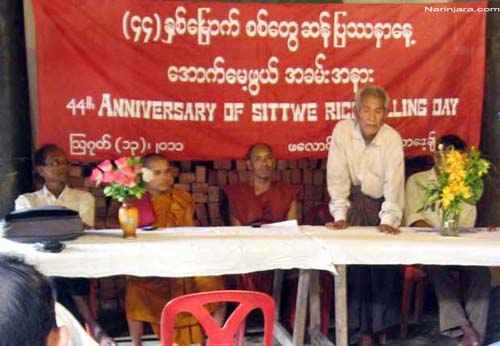Sittwe: Arakanese in their homeland and in exile have observed the 44th anniversary of the Day of the Rice Massacre, also known as the 13 August Social Uprising, in which the Burmese regime of the time had gunned down hundreds of hungry protestors peacefully demanding rice be supplied to them in Arakan's capital Sittwe.

The memorial day of Rice Massacre was observed by Arakanese in exile in Cox’bazar, Bangladesh. The picture was taken on 13 August 2011.
Arakanese in Taunggok and Rangoon in Burma, as well as Arakanese exiled in Bangladesh, India, Thailand, Malaysia, Japan, and the USA have marked the day with public talks, prayers, and offerings of donations dedicated to those who were killed in the uprising.
Daw Pan Thu San, one of the organizers of the event in Rangoon's Hlinetharyar Township, said it is an unforgettable black day and a tragedy for the Arakanese people under the oppressive and successive Burmese military rule in the history of Arakan.
"It is the day very regrettable and unforgettable for our Arakanese people, but the successive military regimes have silenced all their crimes committed against humanity without taking action against those who were responsible and accountable for the mass killings on that day. So we observe the day to raise awareness among ourselves and to make known to other people how the people of Arakan in a closed corner of Burma have been suffering from the brutal and oppressive military rule," said Daw Pan Thu San.
Over 300 people were killed on 13 August, 1967, when the forces of the Ne Win regime opened fire on the peaceful protesters demanding a supply of rice in front of the government-run Mra Rice Mill in Sittwe because they were suffering from famine as rice stocks ran out in the local markets.
According to some town elders who witnessed and participated in the protest, the shortage of rice occurred in Arakan State in 1967 because the state had been hit by a powerful cyclone at the same time the government was forcibly buying large stores of rice from farmers across the state and storing it in the government-owned rice mills for export to foreign countries, without consideration for the public need.
The day was also observed by a youth group in Taunggok, a town in southeastern Arakan State, along with a commemoration for Arakanese democracy leader U Oo Tha Tun, who died in custody after being tortured at Sittwe Prison.
"We have observed the Sittwe Rice Massacre Day along with the commemoration of the anniversary of the death of our democracy leader U Oo Tha Tun, who died due to inhuman torture in Sittwe Prison on 14 August in 1990," said one of the youths.
He said these are heartbreaking days in the history of Arakan State, that resulted from the discriminatory and oppressive practices of the successive military regimes against the ethnic nationalities living in the so-called union or republic of Burma.
The day was also observed by Arakanese people sheltering in countries of exile such as Bangladesh, India, Thailand, Malaysia, Japan, and the USA.
U Thein Aung, an organizer of the event in Bangladesh, said there is no difference in the suffering of the people in Arakan State on that day 44 years ago, and those in the present day.
"If we would recall and compare the suffering of people on the occasion of 13 August 44 years ago and in the present day, there will be no difference. The hungry people then were gunned down by the Ne Win-led BSPP regime, while the hungry people affected by Cyclone Giri and recent disastrous floods across Arakan State are still being neglected by the Thein Sein-led regime and being allowed to die in hunger," said U Thein Aung.
U Thein Aung, on behalf of his committee observing the Sittwe Rice Massacre called on his compatriots at home and abroad to urge the U Thein Sein government and the regional government in Arakan State to act to ensure emergency relief and food is delivered to those suffering from famine in the cyclone- and flood-affected areas of the state.


